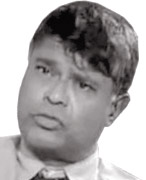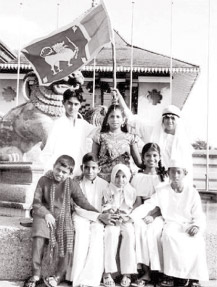|
Lanka doesn’t love India less, or China more - Part
II:
Asia, not a playground for other countries
 Text of a presentation by Prof. Rajiva Wijesinha, MP at the
International Conference on India-Sri Lanka Relations: Strengthening
SAARC Centre for Indian Ocean Studies (CIOS) Osmania University,
Hyderabad, November 8-9, 2012 Text of a presentation by Prof. Rajiva Wijesinha, MP at the
International Conference on India-Sri Lanka Relations: Strengthening
SAARC Centre for Indian Ocean Studies (CIOS) Osmania University,
Hyderabad, November 8-9, 2012
This is augmented by some Sri Lankans who fight the Cold War from the
opposite side as it were. In part because of their understandable anger
with the West for its efforts to prevent the eradication of terrorism,
they forget India’s support for our struggle, and lump both together,
while promoting a polarization that exalts China as the principal
trustworthy ally. The fact that this is not at all what China wants is
forgotten. In Geneva and elsewhere China has advocated working together
with India, in a very different manner from what the West advocated in
the polarizing days of the Cold War.
We then should more consistently affirm the inclusive policies that
the President has formally laid down, namely a return to the
Non-Alignment that the SLFP traditionally followed, with our closest
relationships being with our closest neighbours. We should not allow
Asia to be a playground for other countries, and in that context we must
play an active role in building up understanding within SAARC as well as
amongst other Asian countries.
It is essential for India to foster more positive approaches in other
branches of government as well as Civil Society, to encourage think
tanks to develop policy documents in this regard, and to promote
economic links that will strengthen ties between our peoples.
Several factors unfortunately contribute to continuing
misunderstanding and a failure on both sides to understand how we need
to work together solidly to promote peace and security in South Asia.
The first is the failure on the part of both sides to understand what
inclusivity and pluralism should mean in Sri Lanka.
Technological education
This has necessarily to be different from what obtains in India. In
both countries there were efforts to impose a hegemonic model of
government, but the different circumstances in the two countries meant
that this played out differently. In both countries language was the
initial instrument of domination, but India soon enough realized that
the imposition of one language was not going to work. I believe the
absence of an efficient centralized school system contributed to this as
much as the quasi-Federal structure of government. In addition the
Nehruvian understanding of the need for advanced technological education
meant that aspirations beyond the limitations of a single language were
widespread, and prevented the chauvinism of monolingualism holding sway
for a protracted period.
 |
|
Unity in
diversity |
In Sri Lanka unfortunately we are still stuck in monolingual
mindsets, which militate against the full participation in government
that all citizens should enjoy. This is especially tragic because all
decision makers understand the need for change, and this government in
particular has formalized the need for bilingualism, thus giving teeth
to the change in language policy that was the single most important
reform of 1987. Unfortunately the trilingualism that was originally
agreed on then was defeated by the opposition of the old left, still
stuck in its anti-colonial mindset. Thus the opportunity for wider
activity that could provide dynamic incentives for all to move beyond
monolingualism was minimized.
More seriously, the continuing incompetence of the Ministry of
Education to fulfil the current trilingual policy of the President means
that the empowerment through language rights which all agree on is still
held up. This is an area in which, with its now enlightened language
polices and the expertise in language education developed over the
years, India could contribute much more. But unfortunately Indian
assistance is passive, and thus straitjacketed by continuing statism,
without encouragement of alternative models of teacher supply and
development.
Public servants
The same applies to training for public officials. I am aware that
Indians too complain that their public service is not what it was, but
comparing the capacity of Indian bureaucrats and their ability to
conceptualize and initiate with those of Sri Lanka public servants makes
clear how far we have fallen behind. This is especially sad, because the
talent of our public servants is enormous, understandably so given the
immense competition required to be appointed to established services.
Unfortunately our training is limited, and suggestions to work together
with India to develop collaborative mechanisms are confined to
placements in India rather than the radical adjustments to our current
training systems within Sri Lanka. In particular the need for better
language and other soft skills is not yet understood here, which means
that the capacity to study international developments and benefit from
these is limited.
This is where SAARC could do much more, with institutions that work
together to ensure high level skills in administrators, as well as
common understanding of the political and social compulsions of the
region. My understanding, from the brief period during which I served on
the Board of one of the SAARC Centres, is that, with a few honourable
exceptions, these contribute little to either development or mutual
understanding. It is desirable therefore that SAARC commissions a
serious study of the work of these Centres and tries to develop more
effective systems of collaboration to share and develop best practice.
Tertiary education system
Whilst such collaboration may improve effectiveness, whilst also
promoting mutual understanding, perhaps the single most important area
in which such understanding is vital relates to political structures.
The 13th Amendment to the Constitution, which was passed in 1987
following the Indo-Lankan Accord of that year, was intended to promote
local empowerment, in a context in which centralized decision making had
led to continuing neglect of many parts of the country. This was felt
most strongly in Tamil majority areas, though the fact that we had two
youth insurrections in Sinhala areas indicates that the sense of
deprivation, and consequent bitterness, was nationwide.
This was exacerbated by a comparatively good general education
system, which raised expectations, particularly in Tamil areas, only to
find them shattered by our moribund and limited tertiary education
system, and the statist control of the economy which left little room
for independent initiative. Though the economic dispensation has
changed, our education system has still failed to keep pace with modern
employment needs, and this I fear will be what will lead to continuing
unrest, amongst all communities. Here again we need to learn from India
which, while its general education still lags behind ours, has
encouraged the development of different mechanisms to increase
opportunities for all segments of the population.
Unfortunately, instead of looking at practical needs, our politicians
on all sides are obsessed with theoretical models and the protection of
personal turf. This has prevented educational reform, and it stands in
the way of meaningful political reform. I suppose this is
understandable, since their primary concern is the power that they will
wield, and to what extent this will have to be shared with others. But
what the country as a whole should be concerned with is how power can be
conferred upon the people.
To be continued
|





